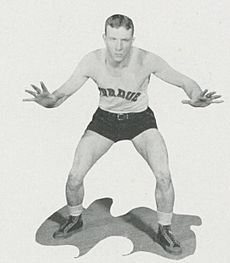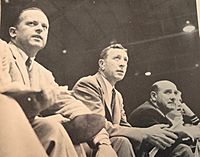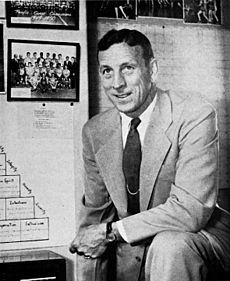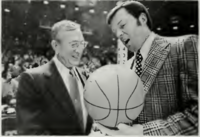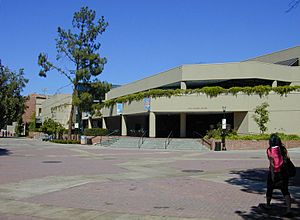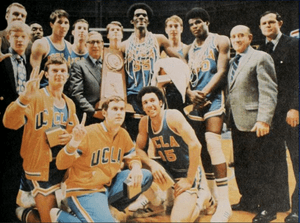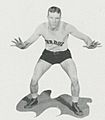John Wooden facts for kids
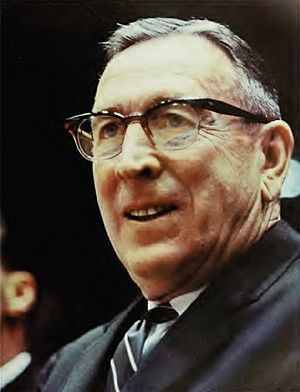
Wooden circa 1972
|
|
| Biographical details | |
|---|---|
| Born | October 14, 1910 Hall, Indiana, U.S. |
| Died | June 4, 2010 (aged 99) Los Angeles, California, U.S. |
| Playing career | |
| Basketball | |
| 1929–1932 | Purdue |
| 1932–1937 | Indianapolis Kautskys |
| 1937–1938 | Whiting / Hammond Ciesar All-Americans |
| 1938–1939 | Indianapolis Kautskys |
| Position(s) | Guard |
| Coaching career (HC unless noted) | |
| Basketball | |
| 1933–1935 | Dayton HS |
| 1935–1944 | South Bend Central HS |
| 1946–1948 | Indiana State |
| 1948–1975 | UCLA |
| Baseball | |
| 1948 | Indiana State |
| Administrative career (AD unless noted) | |
| 1946–1948 | Indiana State |
| Head coaching record | |
| Overall | 664–162 (college basketball) 7–7 (college baseball) |
| Accomplishments and honors | |
| Championships | |
|
As player:
As head coach:
|
|
| Awards | |
|
|
| Basketball Hall of Fame Inducted in 1960 (as a player) 1973 (as a coach) |
|
| College Basketball Hall of Fame Inducted in 2006 |
|
| Military career | |
| Allegiance | United States |
| Service/ |
US Navy |
| Years of service | 1942–1946 |
| Rank | Lieutenant |
| Battles/wars | World War II |
John Robert Wooden (October 14, 1910 – June 4, 2010) was a famous American basketball player and coach. He is known as the "Wizard of Westwood" because of his amazing success. As the head coach at UCLA, he won ten NCAA national championships in just 12 years. This included a record seven championships in a row! No other college team has won more than four in a row.
During this incredible time, his teams also won an NCAA men's basketball record of 88 games in a row. John Wooden was named national coach of the year six times. He also won a national championship as a player for Purdue in 1932. This means he won a total of 11 national titles.
Wooden was a 5'10" guard and was the first player to be named a basketball All-American three times. He was honored in the Basketball Hall of Fame twice. First as a player in 1960, and then as a coach in 1973. He was the first person ever to be included in both categories.
Many people respected Coach Wooden, and his former players loved him. He was famous for his short, simple messages that helped his players succeed in basketball and in life. His most famous idea was the "Pyramid of Success." Wooden's long coaching career and positive reputation have made him a legend in sports, business, and leadership.
Contents
John Wooden's Early Life and Playing Days
John Robert Wooden was born on October 14, 1910, in Hall, Indiana. His parents were Roxie and Joshua Wooden. In 1918, his family moved to a small farm in Centerton. He had three brothers and two sisters. Sadly, one sister died as a baby, and another died from diphtheria at age two.
When John was a boy, his hero was Fuzzy Vandivier. Fuzzy played for the Franklin Wonder Five, a legendary high school basketball team in Indiana. When John was 14, his family moved to Martinsville. He led his high school team to a state championship in 1927. He was chosen as an All-State player three times.
After high school, John went to Purdue University in 1928. He played for coach Ward "Piggy" Lambert. In 1932, his Purdue team was recognized as a national champion before the NCAA tournament existed. John Wooden was named All-Big Ten and All-Midwestern from 1930 to 1932. He was the first player ever to be named a consensus All-American three times. In 1932, he received the Big Ten Medal of Honor. This award recognized student athletes who were excellent in both sports and academics. He earned a degree in English from Purdue in 1932.
After college, Wooden played professional basketball for several years in the NBL. He played for teams like the Indianapolis Kautskys. During this time, he also taught and coached in high school. He once made 134 free throws in a row over 46 games! He was named to the All-NBL First Team for the 1937–38 season.
During World War II, in 1942, he joined the United States Navy. He served until 1946 and left the service as a lieutenant.
John Wooden's Coaching Career
Coaching at Indiana State University
After World War II, Wooden coached at Indiana State Teachers College from 1946 to 1948. He took over from his high school coach, Glenn M. Curtis. Besides coaching basketball, Wooden also coached baseball and was the athletic director. He also taught and worked on his master's degree in education.
In 1947, his basketball team won the Indiana Intercollegiate Conference title. They were invited to the National Association of Intercollegiate Basketball (NAIB) National Tournament. However, Wooden turned down the invitation. This was because the NAIB had a rule that banned black players. One of Wooden's players, Clarence Walker, was a black man.
In 1948, Indiana State won the conference title again. This time, the NAIB had changed its rule about African-American players. Wooden led his team to the NAIB National Tournament final, but they lost to Louisville. This was the only championship game a Wooden-coached team ever lost. Clarence Walker became the first African-American to play in any post-season college basketball tournament that year.
Coaching at UCLA
In 1948, the University of California, Los Angeles (UCLA) hired John Wooden as their new basketball coach. He signed a three-year contract for $6,000 in his first year. Before UCLA, he was also considered for a coaching job at the University of Minnesota. He and his wife wanted to stay in the Midwest. However, bad weather in Minnesota stopped him from getting the phone call from Minnesota. Thinking they weren't interested, Wooden accepted the job at UCLA. When Minnesota called later, he politely declined because he had already given his word to UCLA.
Wooden quickly brought success to UCLA. The basketball program had only won two conference championships in the 18 years before he arrived. In his first season, he turned a team that had a 12–13 record into a champion. They won the Pacific Coast Conference (PCC) Southern Division title with a 22–7 record. This was the most wins for UCLA since they started playing basketball in 1919. He continued this success, winning more titles in his first few years.
By the 1955–56 season, Wooden had built a strong program at UCLA. His team had its first undefeated PCC conference title and a 17-game winning streak. However, they couldn't advance further in the NCAA Tournament for a few years. This was partly because of a ban on all UCLA sports teams due to a scandal involving the football team.
By the 1961–1962 season, the ban was lifted. Wooden led his team back to the top of the conference. For the first time in school history, UCLA reached the Final Four of the NCAA tournament. A close loss in 1962 convinced Wooden that his team was ready to win national championships. Two seasons later, in 1964, assistant coach Jerry Norman suggested a new defense. This "zone press" defense worked well with UCLA's smaller, faster players. It led to more turnovers by the other team and more scoring for UCLA.
The result was amazing: UCLA went 30–0 and won their first national championship in 1964. They beat Duke 98–83 in the final. UCLA had no player taller than 6 feet, 5 inches. Their speed and zone press forced 29 turnovers and overcame Duke's taller players.
In the 1964-1965 season, UCLA won the national championship again. They beat Michigan 91–80 in the finals. In 1966, they finished second in their conference and couldn't play in the NCAA tournament. But in 1967, with sophomore star Lew Alcindor (who later became Kareem Abdul-Jabbar), UCLA returned with a vengeance. They had another undefeated 30–0 season and won the national title. They kept winning every season but one until Wooden retired in 1975.
UCLA's success under Wooden meant they needed a bigger place to play. Since 1932, they had played in the Men's Gym, which was too small. A much larger building, Pauley Pavilion, was built for the 1965–66 season. It opened on November 27, 1965. In a special game, the UCLA varsity team played against the UCLA freshmen. The freshmen, led by Lew Alcindor, easily won 75–60. This showed how good Alcindor and the future teams would be.
A rule change happened in the 1967–1968 season because of Alcindor's dominant play. The dunk shot was banned until 1976. In January 1968, UCLA's 47-game winning streak ended. They lost to Houston, led by Elvin Hayes, in the "Game of the Century." This was the first nationally televised regular season college basketball game. Wooden said, "We have to start over." UCLA then won every game for the rest of the year. They crushed Houston 101–69 in the NCAA tournament semi-finals and went on to win the national championship.
Lew Alcindor finished his college career in 1969 with his third straight national championship. UCLA beat Purdue 92–72 in the final. Alcindor won the tournament MVP award three times in a row. He and Wooden stayed in touch after Alcindor left UCLA. In 2017, Alcindor (as Kareem Abdul-Jabbar) wrote a book called "Coach Wooden and Me" about their friendship.
Many thought UCLA's winning streak would end after Alcindor graduated. But the 1970 team proved them wrong. Players like Sidney Wicks and Henry Bibby led the Bruins to their fourth straight NCAA title. They beat Jacksonville 80–69.
In the 1971 NCAA championship game, UCLA won their fifth straight title, beating Villanova 68–62. The next year, UCLA had their closest championship game, beating Florida State 81–76 to win the 1972 title. After the game, Bill Walton said, "We didn't play well," even though they won.
The 1972–1973 season was unforgettable for UCLA basketball. Freshmen could play varsity again. The Bruins went 30–0 and extended their winning streak to a record 75 games. They easily won the NCAA tournament, beating Memphis State 87–66 in the final. Bill Walton made an incredible 21 of 22 shots in that game. Walton and Wooden were named Player and Coach of the Year again.
UCLA's two big winning streaks ended during the 1973–1974 season. In January, their 88-game winning streak stopped when Notre Dame beat them 71–70. Two months later, North Carolina State defeated UCLA 80–77 in double overtime in the NCAA tournament semifinals.
Wooden coached his last game at Pauley Pavilion on March 1, 1975. It was a 93–59 victory over Stanford. Four weeks later, after a close win in the NCAA Tournament semifinal, Wooden announced he would retire at age 64. His amazing coaching career ended with a victory. UCLA beat Kentucky 92–85 to win Wooden's 10th national championship. This last team was special because it didn't have huge stars like Alcindor or Walton. It was a team of hard-working players.
Andy Hill, a former player, co-wrote a book with Wooden in 2001 called Be Quick—But Don't Hurry! The book showed how Wooden's coaching style could help people succeed in business and life.
Wooden was known as the "Wizard of Westwood," but he didn't like the nickname. He won 620 games in 27 seasons at UCLA. He won 10 NCAA titles in his last 12 seasons, including seven in a row. His UCLA teams also set an NCAA record with an 88-game winning streak and had four perfect 30–0 seasons. They also won 38 straight games in NCAA tournaments and 98 straight home games at Pauley Pavilion. Wooden had a 150–3 record there over 10 seasons.
Wooden never made more than $35,000 a year as a coach. He even turned down an offer to coach the Los Angeles Lakers that was much higher.
John Wooden's NCAA Championship Wins
| Year | Record | Final Opponent | Final score | Key Notes |
|---|---|---|---|---|
| 1964 | 30–0 | Duke | 98–83 | Wooden won his first national title. Senior Walt Hazzard led UCLA to a 16–0 run to beat Duke. |
| 1965 | 28–2 | Michigan | 91–80 | Senior guard Gail Goodrich scored 42 points in the final. UCLA used an effective zone press defense. |
| 1967 | 30–0 | Dayton | 79–64 | The Bruins started a junior and four sophomores, including Lew Alcindor (later Kareem Abdul-Jabbar). |
| 1968 | 29–1 | North Carolina | 78–55 | UCLA's 47-game winning streak ended earlier in the season against Houston. But UCLA got revenge, beating Houston 101–69 in the NCAA semi-finals, then won the title. |
| 1969 | 29–1 | Purdue | 92–72 | UCLA became the only school to win three straight NCAA basketball championships. Wooden became the first coach to win five NCAA titles. Alcindor won three straight MVP awards. |
| 1970 | 28–2 | Jacksonville | 80–69 | Even after Alcindor graduated, UCLA won its fourth championship in a row. They came back from a nine-point deficit. |
| 1971 | 29–1 | Villanova | 68–62 | Senior Steve Patterson scored 29 points in the final. UCLA won its fifth title in a row. |
| 1972 | 30–0 | Florida State | 81–76 | Sophomore Bill Walton led the Bruins to their sixth straight championship. This was their closest title game. They became the first team with three 30–0 seasons. |
| 1973 | 30–0 | Memphis State | 87–66 | The Bruins had back-to-back undefeated seasons and won their seventh straight championship. Bill Walton made 21 of 22 shots, scoring 44 points in the final. |
| 1975 | 28–3 | Kentucky | 92–85 | Coach Wooden ended his 27-year UCLA career by winning his 10th national championship. He announced his retirement after the semi-final win. |
John Wooden's Legacy and Honors
When Wooden started at UCLA in 1948, the basketball program was not well-known. He left it as a national powerhouse with 10 national championships. This is considered the most successful rebuilding project in college basketball history. John Wooden's overall record at UCLA was 620 wins and 147 losses, a winning percentage of .808.
In 2009, The Sporting News named Wooden the "Greatest Coach of All Time."
Wooden received many awards for his achievements. He was named NCAA College Basketball's Coach of the Year multiple times. In 1972, he shared Sports Illustrated magazine's "Sportsman of the Year" award with Billie Jean King. He was inducted into the Basketball Hall of Fame as both a player (1960) and a coach (1973).
After he retired, UCLA honored Wooden with the title of Head Men's Basketball Coach Emeritus. In 2006, Wooden was recognized as a founding member of the National Collegiate Basketball Hall of Fame. He was one of five people chosen for this first group.
Since 1977, the John R. Wooden Award has been given to the best college basketball player of the year. It's like football's Heisman Trophy for college basketball. The MVP award for the McDonald's All-American Game in high school basketball is also named after him. The Wooden Legacy is a basketball tournament held in his honor.
In 1998, the Coach Wooden "Keys to Life" Award was created. It's given to a former player or coach who shows great character, leadership, and faith.
Many places and facilities are named after John Wooden. The gym at his high school, Martinsville High School, has his name. In 2003, UCLA dedicated the basketball court in Pauley Pavilion to John and Nell Wooden. Wooden insisted his wife's name, Nell, come first. In 2008, Indiana State also named their home court the "Nellie and John Wooden Court." The student recreation center at UCLA is also named in his honor.
On July 23, 2003, John Wooden received the Presidential Medal of Freedom. This is the highest award a civilian can get in the United States. President George W. Bush presented it to him.
On Wooden's 96th birthday in 2006, a post office in Reseda, California, was renamed the Coach John Wooden Post Office.
In July 2010, Purdue University, his alma mater, named a street on campus after him. On October 14, 2010, UCLA held a "John Wooden Day Celebration" for his 100th birthday. A part of the UCLA Athletics Hall of Fame is a recreation of Wooden's office to honor him.
John Wooden's Personal Life
John Wooden met his future wife, Nellie "Nell" Riley, when he was a freshman in high school. They were both 21 when they married in August 1932. They had a son, James Hugh Wooden, and a daughter, Nancy Anne Muehlhausen. Nellie passed away from cancer in 1985 at age 73.
Wooden remained dedicated to Nellie's memory for the rest of his life. Every month, on the 21st, he would visit her grave. He would then write a love letter to her. He kept these letters in a stack on the pillow she used to sleep on. He stopped writing the letters only when his eyesight failed in his last months.
John Wooden's Final Years and Passing
Wooden was in good health for most of his life. On May 26, 2010, he was admitted to the hospital for dehydration. He passed away from natural causes at age 99 on June 4, 2010. He was survived by his children, grandchildren, and great-grandchildren. After a private ceremony, Wooden was buried with his wife Nellie at Forest Lawn Memorial Park in Los Angeles. A public memorial service was held at UCLA's Pauley Pavilion two weeks later.
John Wooden's Seven Point Creed
John Wooden's father, Joshua, gave him this "Seven Point Creed" when he graduated from grammar school:
- Be true to yourself.
- Make each day your masterpiece.
- Help others.
- Drink deeply from good books, especially the Bible.
- Make friendship a fine art.
- Build a shelter against a rainy day.
- Pray for guidance and give thanks for your blessings every day.
Wooden also wrote a book about his "Pyramid of Success." This pyramid is made of ideas for succeeding in basketball and in life. Later in his life, companies hired him to give inspiring talks. He even appeared in commercials. After he passed away in 2010, all UCLA sports teams wore a patch or sticker with "JRW" inside a black pyramid. This honored his philosophy. The men's basketball team still wears the patch today. Wooden defined "Competitive Greatness" (at the top of his pyramid) as: "Perform at your best when your best is required. Your best is required each day."
Some of Wooden's other famous sayings include:
- Failing to prepare is preparing to fail (from Benjamin Franklin)
- Flexibility is the key to stability
- Be quick, but don't hurry
- Seek opportunities to show you care. The smallest gestures often make the biggest difference
Images for kids
See also
 In Spanish: John Wooden para niños
In Spanish: John Wooden para niños


